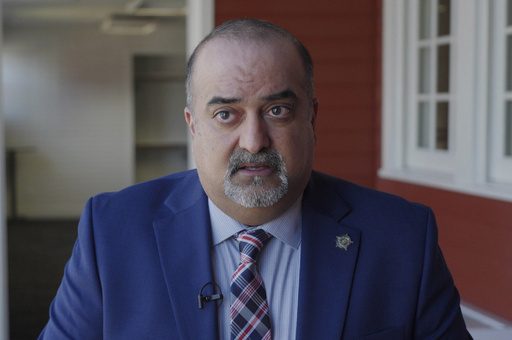Kim Potter, a former Minnesota police officer who was convicted of accidentally killing Black motorist Daunte Wright by using her handgun instead of her taser during a traffic stop, has completed her prison sentence and is now actively participating in law enforcement conferences to share her story and knowledge. Potter’s decision to deliver presentations at these conferences has sparked a heated debate on how officers who have been convicted of misconduct should seek redemption and make amends for their actions.
After serving her sentence for Wright’s death, Potter met with the prosecutor who handled her case, Imran Ali. Ali shared that Potter expressed a desire to help other officers avoid similar fatal mistakes in the future. He viewed Potter’s presentations as a way for police officers who have erred to seek redemption and assist in healing communities affected by police misconduct.
However, Wright’s mother, Katie Wright, expressed her dismay at Potter potentially profiting from her son’s death through these presentations. She emphasized that Potter already had her second chance by being able to return home to her family after the incident, while victims like her son do not have the same opportunity.
Potter’s scheduled presentation at a law enforcement agency in Washington state was canceled abruptly in September due to public criticism. Despite this, other law enforcement groups, including a major one in Minnesota, have hosted Potter’s presentations and continue to invite her to speak at their events.
Some individuals argue that canceling Potter’s presentations would be short-sighted, as she could provide a cautionary tale for other officers facing similar life-or-death decisions in the field. Ali, who resigned from the case against Potter due to external pressures, is now working to help police departments implement changes that could prevent similar tragedies in the future.
Minnesota Attorney General Keith Ellison believes that Potter’s public expression of remorse could contribute to community healing. Wright’s tragic death in April 2021 in Brooklyn Center reignited protests in Minneapolis and beyond, adding to the turmoil following George Floyd’s murder. Potter was later found guilty of manslaughter and sentenced to two years in prison, being released after 16 months.
Potter and Ali have become regular speakers at Minnesota Sheriff’s Association events, delivering training sessions and presentations aimed at educating law enforcement officers on the consequences of their actions and the importance of proper training. Despite criticisms regarding potential profit motives behind these presentations, Ali and Potter emphasize their commitment to promoting positive change within law enforcement.
While some critics question the motives behind Potter’s presentations, others, like James Stuart from the Minnesota Sheriff’s Association, advocate for learning from mistakes like Potter’s to prevent similar tragedies in the future. The ongoing debate surrounding Potter’s involvement in law enforcement conferences highlights the complexities of seeking redemption and making amends after being convicted of a crime in a high-profile case.


